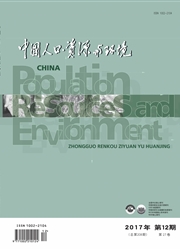

 中文摘要:
中文摘要:
我国境内石油行业总体呈现原油开采量上升的态势,为之付出的经济和生态成本也越来越大。开展我国境内石油资源资产负债表的编制工作对于摸清我国石油资源的家底、评估我国石油资源开采的经济—资源—环境综合成本、探讨我国石油开采战略的合理性具有重要的意义。本文首先探讨了石油资源资产负债表的编制方法和框架,构建了集"生态系统服务"、"环境污染"和"资源消耗"三位于一体的"生态负债"账户。其次,收集并整理了重要的污染物处理成本和生态系统服务的价值评估成果,构建了价值化因子数据表。最后,基于2012年数据尝试编制了目前我国的第一份石油资源资产负债表。结果显示,(1)2012年末,我国石油资源的资产总额为1.47×10^9万元,负债总额为9.03×10^7万元,所有者权益为1.38×10^9万元;(2)石油资源资产总额占到当年政府资产总额的14.43%,占政府资源性资产比重达31.12%;(3)石油行业的资产负债率为6.15%,负债权益比达到了6.56%;(4)"生态系统服务"构成了负债的最大比重,达到了98.16%。总的来说,我国石油开采行业整体处于"高资产、高负债、强生态压力和弱可持续性"的状态。从这份资产负债表我们可以看出,我国境内石油开采的生态成本不容忽视。随着资源的不断开发,石油开采的边际生态成本只会越来越大,因此,能指向经济和生态两方面的综合成本应该取代账面成本成为政府进行石油资源开发的决策依据之一。此外,要落实石油资源资产负债表对于生态保护的实际指导意义,我们建议应该将石油资源开采的资产负债率、负债权益比等指标纳入官员的绩效考核体系。
 英文摘要:
英文摘要:
Crude oil extraction in China has been climbing, so does the economic and ecological cost alongside. Constructing the balance sheet of domestic oil resource is crucial to reveal the real state of China' s oil resource, estimate the integrated economic- resource-environmental cost of oil exploiting, as well as to evaluate the rationality of oil extracting strategy. This paper first discusses how to construct a balance sheet and its framework, building up an ‘ Ecological Liability' account consisting of ‘ ecological service' , ‘ environmental pollution' and ‘ resources consumption'. Then we collect and analyze data on the monetary cost of major pollutants and estimate the value of diverse ecosystem services, forming a corresponding database of valuation factors. Finally, we construct China' s first oil resource balance sheet based on the data of year 2012. Results show that, ①at the end of 2012, total assets of China' s oil resource amounts to 1.47 × 10^13 yuan, liabilities 9.03 × 10^11 yuan, and owner' s equities 1. 38× 10^13 yuan. ②The assets of oil resource account for 14.43% of total government assets, and 31.12% of the government's resources assets. ③The asset-liability ratio of the oil industry in China is 6.15% and the liability-equity ratio is 6.56%.④The reduction of ecosystem services accounts for most of the liabilities--up to a shocking 98.16%. In general, the current state of China' s oil extraction can be concluded as "high property, high debt, intense ecological pressure, and fragile sustainability". The balance sheet has revealed the unneglectable ecological cost of oil exploiting in China, and the marginal cost would still be mounting as oil extraction runs extensive. Thus, the government' s decision concerning oil exploiting should be based on a comprehensive economic and ecological cost, rather than the traditional economic cost. Furthermore, we propose that the asset-liability ratio and liability-equity ratio based on the resource balance sheet should
 同期刊论文项目
同期刊论文项目
 同项目期刊论文
同项目期刊论文
 期刊信息
期刊信息
